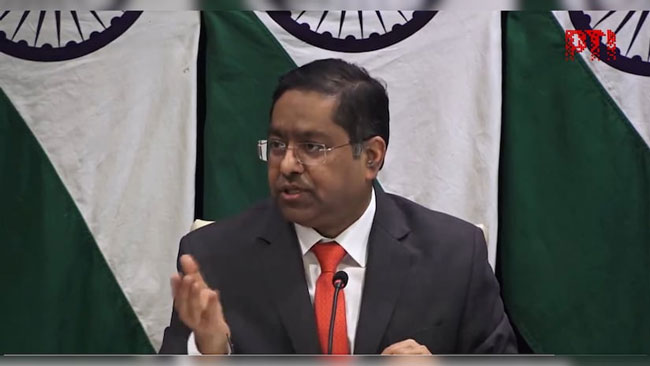New Delhi: Tensions between India and Bangladesh have escalated over border security concerns. A recent dispute arose in Sukdevpur village of Malda district, West Bengal, between the Border Security Force (BSF) of India and the Border Guard Bangladesh (BGB). The disagreement stems from India’s efforts to erect fencing along the border, which Bangladesh claims violates bilateral agreements.
On Friday, the Ministry of External Affairs (MEA) spokesperson, Randhir Jaiswal, reiterated India’s stance, stating, “We have clarified our position. The acting Deputy High Commissioner of Bangladesh was summoned, and our perspective on border fencing was conveyed. India remains committed to ensuring a crime-free border with Bangladesh.” Jaiswal added that fencing, border lighting, installation of technical equipment, and cattle barriers are part of India’s efforts to curb smuggling, human trafficking, and other crimes.
The India-Bangladesh border stretches over 4,096 kilometers and has long been a contentious issue. Recently, India initiated plans to construct fencing at five locations along the border, prompting strong objections from Bangladesh. The ongoing dispute in Sukdevpur village has further strained the already tense bilateral relations.
This friction comes amid political changes in Bangladesh, where Nobel laureate Muhammad Yunus replaced former Prime Minister Sheikh Hasina as the head of a caretaker government in August last year. The change in leadership has reportedly added complexity to India-Bangladesh relations, and the current border tensions exacerbate the situation.
India insists that its fencing initiatives aim to combat crimes and align with prior agreements. MEA officials have expressed hope that Bangladesh will honor these agreements and collaborate with India to address border crimes effectively.
On January 13, India summoned Bangladesh’s Acting High Commissioner, Noor-ul-Islam, to convey its concerns. This action followed Bangladesh’s summoning of Indian High Commissioner Pranay Verma to raise objections over the BSF’s activities.
In a formal statement, the MEA emphasized that all protocols and agreements between the two governments and their border forces have been adhered to in implementing security measures, including fencing.
“India reiterated its commitment to ensuring a crime-free border by addressing issues like smuggling, human trafficking, and cross-border criminal activities,” the statement said. It also highlighted that measures such as barbed wire fencing, lighting, and technological installations are vital for securing the border.
The MEA urged Bangladesh to honor earlier agreements and adopt a cooperative approach to address cross-border crimes.




